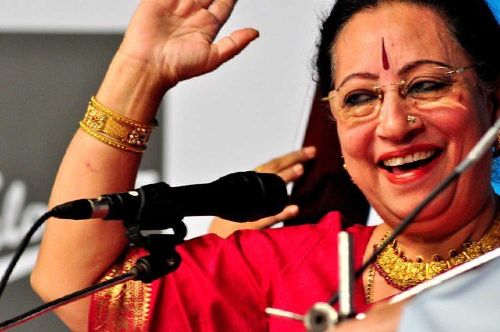Begum Parveen Sultana

Subscribe to read full article
This section is for paid subscribers only. Our subscription is only $37/- for one full year.
You get unlimited access to all paid section and features on the website with this subscription.
Not ready for a full subscription?
You can access this article for $2 , and have it saved to your account for one year.
- Born: 10 July, 1950 (Nagaon, Assam)
- Primary Cinema: Hindi
- Parents: Ikramul Mazid
- Spouse: Ustad Dilshad Khan
- Children: Shadaab Sultana Khan
Padma Bhushan-award-winning Hindustani classical singer of the Patiala gharana, Begum Parveen Sultana has also carved a successful career in playback singing in Hindi and Assamese language cinema. Debuting with Abdul Majid’s Morom Trishna (1968), she went on to render iconic songs such as Hamen tumse pyar kitna from Kudrat (1981) and Aan milo sajna from Gadar: Ek Prem Katha (2001). Other key songs she has rendered include Kaun gali gayo shyam from Pakeezah (1972), Pital ki meri gaagri from Do Boond Paani (1971), Piya ki gali from Parwana (1971), Ram kare mora saiyaa ho aise from Khoj (1971), Shubh ghadi aayi re from Razia Sultan (1983), Bichhurat mose Kanha from Vijeta (1982), Yeh bahut khushi ki nishaani hai from Sharda (1981), and Vaada tum se hai vaada which was the theme song from the film 1920 (2008). While she received the Filmfare Best Female Playback Award for Kudrat’s Hame tumse pyar kitna, Sultana is also recipient of the Sangeet Natak Akademi Award.
Born on 10 July, 1950 in Nagaon, Assam, her passion for music was spotted early on by her father, an Afghan musician named Ikramul Mazid. He not only taught her, but was also strict about what she listened to, allowing only Lata Mangeshkar and Mohammed Rafi, or classical musicians to be played in the house. After her initial training with Birendra Kumar Phukan and Hiren Sarma, she went on to learn from Pandit Chinmoy Lahiri, a Bengali musician who lived in Lucknow and had trained under nine gharanas. She also followed the style of Ustad Bade Ghulam Ali Khan and Ustad Salamat Khan. Begum Parveen Sultana is of the belief that a parent gharana is important but one need not bind themselves to it. In order to evolve, it is important to learn and understand what everyone has to offer.
She started her professional career as a playback singer with Abdul Majid's Assamese film Morom Trishna in 1968. Rendering songs for several other Assamese films, she also sang for Hindi films such as Gadar, Kudrat, Do Boond Pani, and Pakeezah.
Apparently, when composer R D Burman decided on having a female version for one of his compositions in Chetan Anand’s Kudrat (1981), he wanted it to be distinctly different from the male version which he had created for Kishore Kumar. Sultana was chosen to render the female version of Humein tumse pyar kitna as a short bandish and not a romantic film song. While Kishore Kumar’s version became very popular, Sultana won the Filmfare Award as well as much praise from the classical and film world. Sultana developed a reputation for being the go-to singer for a tough song. As composer Khaiyyam declared, she could deliver on difficult songs like it was the easiest thing created.
She grabbed attention with Naushad’s Kaun gali gayo Shyam in Kamal Amrohi’s Pakeezah (1971). A popular thumri in Mishra Khamaj, the night melody plays in the background as Sahibjaan climbs the steps of a kotha in Lucknow.
While Sultana enjoyed the experience of working with legends like Naushad, she was never entirely satisfied by film music, desiring to do much more than just sing for five-seven minutes. For Sultana, the satisfaction, practice, pleasure and godliness of classical music could not be replaced by anything.
Parveen Sultana has recorded for HMV, Polydor, Music India, Bharat Records, Auvidis, Magnasound, Sonodisc, and Amigo. Among her many albums released are An Hour of Ecstasy (Raga Madhuwanti/ Raga Gorakh Kalyan/ Raga Mishra Bhairavi thumri/ Bhajan), Narayani (Raga Narayani), Young Voices of India (Modern Ghazals) - Maikada se utha ke pila Saaqiya, Begum Parveen Sultana (Raga Salag Varali todi/ Raga Lalita/ Raga Khamaj thumri), Enchanting Bhajans (Raga Rageshri/ Bhajan/ Bhajan/ Bhajan), and Khayal & Thumri (Raga Kusumi Kalyan/ Raga Mangal Bhairav/ Raga Bhairavi thumri).
Among the awards Sultana has received are the Gandharva Kalanidhi, Miyan Tansen Prize, Sangeet Samraggi conferred by the Assam Government, Filmfare Best Female Playback Award--Kudrat (1981) for the song Hame tumse pyar kitna, Sangeet Natak Akademi Award, Srimant Sankardev award by the Assam government, and the Padma Bhushan by Government of India.
On the personal front, she is married to Ustad Dilshad Khan, of the Kirana gharana. She had begun learning from him for two years, post which they married, and became popular as a performing duo. Sultana believes the concept of jugalbandi can work well when blood relatives or husband-wife perform together. Having Khan as a guru helped, as he knew what her voice was capable of, and he also provided her the necessary support, also ensuring she performed and didn’t get too occupied with domestic responsibilities.
Receiving the Padma Shri at 26 at the hands of Indira Gandhi in 1976, remains a high point as the then PM told her that she was an inspiration for other female musicians of the country. It remains, for Begum Parveen Sultana, one of the best days of her life.
References
Images courtesy: https://www.cinestaan.com/articles/2018/jul/10/14296/tracing-classical-singer-begum-parveen-sultana-s-journey-in-cinema-68th-birthday-special







.jpg)



